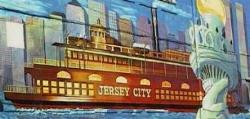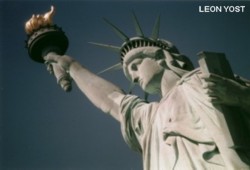 |  |  |
|
| ||
 |  |  |
 |  |  |
|
| ||
 |  |  |
|
|
 Buy Online |
Jersey City-born Historian and Novelist |
 |
|
|
|
Thomas Fleming who is familiar to all from his many appearances on Channel 13 -- most recently in The Irish in America -- widens his nonfiction reach with the publication of The New Dealers' War: Franklin D. Roosevelt and the War Within World War II (Basic Books). The book explores the clash between New Dealers and conservative and modern Democrats and Republicans during the war that shaped the second half of our century. Former Jersey City mayor, Frank Hague plays a prominent role in several chapters.
His 21st novel, When This Cruel War is Over (set in the American Civil War), is now also at the booksellers. "Shake hands like a man," Tom Fleming's father, leader of Jersey City's Sixth Ward, told him from the age of three. "Aim High!" his mother wrote in his 8th grade autograph book at St. Patrick's school. His mother, Katherine Dolan Fleming, was a beautiful dark-haired romantic, the daughter of a prosperous carpenter. His father, Thomas J. "Teddy" Fleming, was born poor, the son of an illiterate laborer. |
 |
At election night parties, the young Fleming absorbed the ethos of the Hague Organization. It was "us" -- Jersey City's ethnic Catholics -- against "them" -- the Anglo-Saxon Protestants who ran the rest of New Jersey. In St. Patrick's School nuns and priests taught him always to tell the truth, to obey the law, to trust God and love mankind, ideals his mother earnestly seconded. In the streets of the Sixth Ward, nerve was what counted -- the readiness to silence opposition with a nightstick if necessary and pile up the votes with a nice combination of threats and rewards, including cold cash on election day. The goal was power and jobs for the Democratic Party's faithful.
|
|
This clash between his mother's soaring ideals and his father's tough realities has played a major role in Fleming's literary imagination. His first books alternated between nonfiction on the American Revolution and a series of novels (All Good Men, The God of Love, King of the Hill and Rulers of the City) about the collapse of an Irish-American political machine (the Hague organization fell apart in 1949) and its impact on the lives of the leaders, the followers and their families. Critic and novelist Roger Dooley called this cycle, set in the imagined city of Hamilton, New Jersey, "a powerful fictional experience that relegates other novels on big city politics to the whimsical realm." In Jersey City, everyone read the books as barely concealed nonfiction. Johnny Duff, assistant leader of the Sixth Ward, said of All Good Men: "I can recognize every guy in the book as a real person with a different name."
|
|
Dean of American historians Allan Nevins said Fleming's second history book, Beat The Last Drum, the story of Yorktown, was "assuredly one of the outstanding historical works of the year." This praise led to an invitation to write a history of the U.S. Military Academy. In the course of four research years at the school, Fleming got to know many officers and their wives. He found in the military experience a clash between ideals and reality similar to the one that permeated his boyhood in Jersey City. In the West Pointers' case, the ideals were sharply articulated as duty, honor country. In the real world of the Army, they had to figure out how to fit these noble words into a business that often involved throat-cutting careerism and the possibility that the bottom line was death.
Army wives, who were both participants and observers, saw this conflict more vividly than their husbands. In the decade after he finished his history of West Point, Fleming wrote The Officers' Wives, a novel that dealt with three very different women who married graduates of the class of 1950 and followed them through the disillusions and heartbreaks of Korea and Vietnam. The book was an international best seller.
Meanwhile, he had begun writing a series of novels about a powerful American family called the Stapletons. Modelled loosely on the Stocktons and the Stevenses, two notable New Jersey families, the Stapletons carry with them a large freight of American history as they progress from colonial merchants (Remember The Morning) to Gilded Age industrialists (The Spoils of War) and from Federalist politicians (Dreams of Glory) to Washington, D.C. power brokers (The Wages of Fame) In the best American tradition, Stapleton sons repudiate fathers, marry women with ideas of their own about the pursuit of happiness, bleed in America's wars and barely survive the nation's financial panics and depressions.
Ultimately his Stapletons intersect with the Irish-Americans of Fleming's political cycle. In Promises To Keep, Jim Kilpatrick is hired to write the biography of Paul Stapleton, the war hero scion of the 20th Century branch of the family. Disillusioned by the death of a son in Vietnam, Kilpatrick declines to write a panegyric. He digs into the gritty underside of Stapleton's career. Eventually he discovers that in the 1930s, this supposed WASP paragon paid a huge bribe to the Democratic politicians who ruled New Jersey to enable him to move the family's textile mills to North Carolina without ruinous legal and financial complications.
When Kilpatrick confronts Stapleton with the evidence, he admits everything -- and informs him that he gave the money to Kilpatrick's father, who was the chief justice of New Jersey's supreme court at the time. "We're all in this together, Jim," Paul Stapleton says.
He meant (and Fleming meant) they were all -- WASPS, Irish-Americans, Jewish-Americans, Italian-Americans, Polish-Americans, African-Americans -- in the American experience together, with its confusing mix of ruthless competition and dreams of brotherhood, of repression and liberation, of wrenching loss and inexplicable spiritual gain.
While ranging across U.S. history with the Stapletons, Fleming retained a strong interest in the American Revolution. He wrote a well received novel, Liberty Tavern, set in New Jersey's Monmouth County, which portrayed the conflict as a civil war. He also wrote biographies of Thomas Jefferson (The Man From Monticello) and Benjamin Franklin (The Man Who Dared the Lightning) to enlarge his grasp of the Revolution's ideas and ideals. He decided his youthful view of the conflict was too narrowly military and wrote 1776: Year of Illusions. The book demonstrated that both the Americans the British were in the grip of delusions of moral and military grandeur which evaporated in the harsh realities of this pivotal year.
In the next two decades Fleming broadened and deepened his exploration of the clash between America's realities and its ideals. Time And Tide is a novel about the USS Jefferson City, a morally stained cruiser that sails symbolically through the Pacific War. The captain is an anti-Ahab figure who refuses to abandon the American dream of brotherhood in spite of multiple betrayals. Over There portrays a cynical American general astonished to find himself in love with a redheaded feminist ambulance driver in the cauldron of World War I's Western Front. Loyalties is about an American intelligence officer who loves a woman involved in the German Resistance to Hitler. In this book Fleming became convinced that to confront radical evil, idealism needed religious faith -- even if it is only a spark in the prevailing darkness.
In 1997, Fleming summed up his thinking on his favorite historical era in Liberty! The American Revolution, the companion volume to the award winning PBS series. It was a main selection of the Book of the Month Club. He became the only writer in their 70 year history to have won this kudo in both fiction (The Officers' Wives) and nonfiction. Liberty! was also a main selection of the History Book Club.
Liberty! moved beyond the semi-debunking tone of 1776: Year of Illusions to a perception of Revolutionary America as a multi-ethnic society, with over 40 percent of the population Irish, German, Dutch and African Americans. Liberty was the force, the idea, that galvanized and sustained this new people.
In 1999, Hours of Gladness portrayed heirs of New Jersey's Irish-American chieftains, out of power and tragically out of sympathy with two IRA men who attempt to smuggle weapons from Cuba for the civil war in Northern Ireland. Fleming has also continued his time-travels with the Stapletons. In March, Forge Books published When This Cruel War Is Over, a novel about Major Paul Stapleton, a West Pointer who struggles against disillusion in the last summer of the Civil War.
When asked to sum up his subject matter as a writer, Fleming says: "I would say it all in one word: America. I will never tire of exploring in the past and present the tension between its ideals and its realities and the impact of this great dichotomy on individual men and women, on the conduct of America's wars and its politics and ultimately on the soul of this vanguard nation, to whom the world looks for leadership."
 Your Ancestors' Story |
 Bruce Springsteen's Jersey Shore Rock Haven! |

|
UrbanTimes.com |